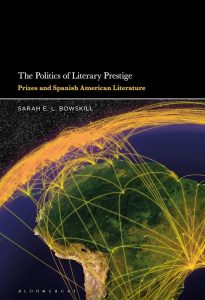This post is part of our Research Initiation Scheme for 2021-2022.
On Friday 11th February, Dr Sarah Bowskill (Senior Lecturer in Latin American Studies, QUB) delivered a seminar entitled ‘Prizes for Spanish American Literature and the Changing Role of the Author in Society’ at the 2021-2022 Modern Languages Core Disciplinary Research Group Seminar Series. Dr Bowskill’s talk explored the link between power and literary prestige, focusing particularly on how politics underpins Spanish American literary prizes and award ceremonies, and the role of the author in society.

The talk commenced with an overview of the intertwining of literature and politics in Latin America. Dr Bowskill drew on the work of Doris Sommer to explain that in the nineteenth century, post-independence Latin American nations were built by author statesmen, such as Domingo Faustino Sarmiento and Bartolomé Mitre. Writing formed an important part of their political work, and the texts written by these author statesmen were taught in schools, and intended to inspire love for the nation. By the early twentieth century, national prizes for literature were used by the state to further connect literary and political fields. Dr Bowskill highlighted the motivation behind introducing such prizes, since Latin American countries looked to prizes for science and literature as a way to establish international status and national pride.
Continue reading